[Sadly, the Wayback Machine “original” version of this post, from 27 October 2007, no longer exists (occasionally you get that from the Wayback Machine, even if it appears you can find it), which is too bad because it got a lot of comments, none of which we can see anymore. Still, this is a fun column. Enjoy!]
There has been a lot said in the comics press regarding the creator’s rights issues and financial and moral considerations surrounding the controversial revival at Marvel of Omega the Unknown. Our own Mark Andrew did a nice job of summing up here [Edit: Hey, that link works!] not too long ago, for those who came in late. But there’s one particular aspect of it that no one has really talked about that much — not even Omega’s original creators, Steve Gerber or Mary Skrenes. And to my mind, it’s the single most grating aspect of the whole thing.
The thing that annoys me and many other fans of Steve Gerber’s work on Omega, more than anything else, is that he never got a chance to FINISH it. That’s what’s so maddening to those of us out here that cherished the original. The key difference with this particular case of superhero-trademark-revival syndrome, the thing that raises it from merely irritating to utterly infuriating from a long-time Marvel reader’s perspective, is that this was our chance, finally, to see what Gerber was REALLY going to do with the ending. And Marvel blew us all off. Again.
I’m sure most of you reading this know the story behind the story. I’ve even commented on it in this space myself.
So we’ll make the recap quick. In the 70’s the original Omega was a wildly experimental take on the superhero idea, decades ahead of its time, and despite a number of mainstream Marvel guest stars and villains it was canceled after ten issues. In mid-story. The last panel of #10 had a brief note: “The story of Omega the Unknown will be concluded in a future issue of the Defenders.”
Except Gerber left the Defenders title as well, and shortly thereafter, left Marvel entirely. And that was that. Finally, in response to fan requests, Marvel gave us a somewhat cursory wrap-up in Defenders #76 and #77, courtesy of Steven Grant.
It’s included in the recent trade paperback reprint of the original Omega the Unknown, if you are morbidly curious. It was a good try, I suppose — with the distance of years, I can appreciate today that Grant was giving it his best shot, but his sensibility simply isn’t Steve Gerber’s. Certainly he didn’t have the personal investment in the material.
At the time, it felt like a betrayal. The kind of cursory shut-up-and-go-away effort you get from a tired parent who can’t be bothered with story time before bed. “Yeah, so then they all fell off a cliff and died. The end. Now goddammit, go to sleep.”
So my first thought, when I heard Marvel was reviving the book, was: Did they let Gerber do the real ending? Then I read who was writing it and thought hopefully, off Gerber’s original plot, or with his input? Nope. Just another novelist slumming in comics and getting his fanboy on.
Frankly, my response to this is: well, hell, I could write a fanfic Omega ending. I want the REAL one. I want to know what Gerber was originally going to do. That’s been the itch Steve Gerber fans haven’t been able to scratch for thirty years.
There’s a special kind of irritation that comes with getting cut off in the middle of something. Superhero fans are used to creative teams changing the entire feel of a book, but these days, when a book’s cancellation is imminent, there is generally the gift of the courtesy wrapup.
Not so, in earlier years. Marvel often cut books off in mid-story and gave us a cursory wrapup in some other comic. Sometimes we’d get a note advising us of it in the Bullpen Bulletins; other times, you just had to keep an eye out. And almost always, the wrapup was thrown to whoever was convenient, not the creator who’d invested all the time in the original story.
I was thinking about that phenomenon this week and it dawned on me that the first time I’d experienced it, the convenient guy brought in to knock out a rush ending was … Steve Gerber.
In fairness, Gerber was a fairly new guy at Marvel then; I’m pretty sure this was before the Duck and Man-Thing made him a star. And the cursory rush wrapup was for a pretty minor character. But I really liked him, damn it.
Ulysses Bloodstone was the creation of John Warner, who wrote a couple of interesting strips for Marvel and Gold Key in the 70’s, and was even briefly an editor of Marvel’s black-and-white magazine line.
Bloodstone had a couple of appearances in Marvel Presents before taking over the backup slot in the early issues of the Rampaging Hulk magazine.
Getting relegated to backup status was actually a really good fit for the series. Bloodstone was easily the most interesting thing about the Rampaging Hulk magazine in its original, black-and-white incarnation. The Hulk stories in the front were a bit confusing and never quite seemed to jell, but the Bloodstone serial in the back was building some nice momentum and had a cool conspiracy story going; in fact, the villains even went by the name of The Conspiracy.
Then suddenly Warner was gone, and Steve Gerber stepped in to write one of those everything-you-know-is-wrong twist ending stories where Ulysses Bloodstone ended up sacrificing his life to save humanity, but only after Gerber made it a point to have him denounced as a dumb caveman who’d never really evolved during the ten thousand years he’d been fighting evil. It seemed oddly cynical, almost rude. In fact, to me as a reader, it felt a lot like the way Steven Grant blew off the Omega wrapup a couple of years later. “Then there was a big explosion and Bloodstone and the bad guys all died, the end. Now shut up.” And that was it for the Bloodstone strip. Next issue the backup story was Shanna the She-Devil, and then the whole magazine got a facelift.
It’s tempting to draw some sort of parallel, to suggest that there was some element of karma involved or something: Gerber does it to Warner, then Grant does it to Gerber. But I suspect the situations are really quite different — as many of those who worked there in the 70’s have said in numerous interviews, the Marvel writers always tried to check in with one another back then about using each others’ creations and I have no reason to think that didn’t happen with Steve Gerber and John Warner; especially since the episode took place in the more informal pre-Shooter years.
But I still couldn’t help feeling that a character I had grown fond of had been jeered at and pointlessly ruined by the people who were in charge of his destiny. (I wasn’t quite as upset as the HEAT guys later got over Hal Jordan, but it was that same feeling, I admit it.)
And there’s also that same sense of ‘unfinished,’ the itch that can’t be scratched. I don’t know what John Warner had in mind originally for the ending but I can’t believe that it was that Ulysses Bloodstone was just a doofus who’d been manipulated into being the punchline to a cosmic joke. I am still curious what the REAL Conspiracy story would have been. I admit to feeling a ridiculous sense of vindication seeing the various Bloodstone references and cameos in recent years from Marvel, and even the sort of revival in NextWave. At least I’m not the only one that liked it.
Erratic editorial behavior was something you learned to deal with, reading Marvel Comics in the 1970’s — don’t even get me started on Skull the Slayer or the Scarecrow — but I never got to like it.
DC would start and cancel series just as capriciously, but DC books tended to be done-in-one; you didn’t get quite as rattled. Marvel, which was making its rep on the serialized endless melodrama and prided itself on attention to continuity, didn’t do nearly as well with a sudden stop.
Another case of a last-minute writer pinch-hitting through a rush ending happened with one of my favorite creators on my favorite character in my second-favorite Marvel book of the time.
Steve Englehart was doing amazing work at Marvel in the 70’s. I loved his Beast, his Avengers, his Captains America and Mar-Vell … but more than any of those I loved his Doctor Strange. Englehart and Brunner’s run on the book is still talked about today, and Englehart and Colan were just as good. Sadly, when Steve Englehart quit Marvel in a huff it was Doc that was hardest hit.
The book had just started a storyline in honor of the U.S. Bicentennial called “The Occult History of America.” Doc was leading Clea through the 1700’s, telling her all this stuff about how Francis Bacon and Benjamin Franklin and other historical figures were actually mystics and sorcerers, and failing utterly to notice that Clea is bored and restless and very willing to embark on an affair with Ben Franklin. Suddenly a wizard named Stygyro attacked. Their battle raged throughout American history …
… for all of two issues. In the third issue of what turned out to be only a three-parter, the creative team was Marv Wolfman and Alfredo Alcala and it was revealed the whole thing was an illusion, even the affair part with Clea and Franklin (probably ESPECIALLY the affair part, I think that must have made someone in editorial very uncomfortable) arranged by the Ancient One just to test Stephen’s readiness to ascend to Nirvana, which he refused to do. Next issue it was all superhero fight stuff with some character named Xander the Merciless.
Blegh. Wolfman left the book soon after, and I think we were all relieved. Including, I suspect, Marv Wolfman himself. It wasn’t his kind of book.
But at least this time I got to find out what the original story was going to be. Steve Englehart gave an interview to Comics Feature where he discussed all the plots he’d had in mind. The Bicentennial story would have climaxed with a battle between Strange and Stygyro in the skies of Philadelphia as the Founding Fathers conferred over the Declaration or the Consitution or something — I can’t remember exactly, but somehow Dr. Strange saves American history. Dr. Strange also has to do some relationship building and forgive Clea, who is a princess, after all, and not ready to be relegated to sidekick. I think he intended for them to work it out but it would have been painful.
We also found out what Englehart had in mind for Lord Phyffe’s sudden panic and departure; turns out, when Strange explains how Eternity re-created the world in #13, Phyffe realizes that makes him the thirteenth generation and not the twelfth, and there is a terrible curse on the thirteenth generation of Phyffes that Doc has to overcome to save his friend. After that, Englehart was going to do a crossover with Master of Kung Fu where Strange fought Fu Manchu.
Sadly, none of that happened. But at least it’s nice to know.
One other really egregious case of 70’s Marvel stop-n-start involved T’Challa, the Black Panther.
This is the book, along with Killraven, that really made Don MacGregor’s reputation as the most lit’ry writer at Marvel. Looking back, the book doesn’t hold up all that well — but by God MacGregor was REACHING for the gold, the book was practically sweating with its need to be Groundbreaking. And at the time we were all so awestruck by the sheer ambition of doing a huge epic like “Panther’s Rage,” that the florid overwriting and palpitating melodrama seemed positively cutting-edge.
Then MacGregor followed that up with the Panther taking on the Ku Klux Klan … the REAL Klan, not some phony Marvelized hate group like the Sons of the Serpent. Ripped from the headlines!! Comics had ARRIVED as Serious Literature, baby. We were doing Important Relevant Stories now.
Except the Klan story only ran a couple of issues before the book just stopped. And suddenly here was Jack Kirby doing crazy stuff like this.
Now, this was actually an amusing run, and frankly I enjoy it more than the MacGregor Panther. I was very pleased to see it recently collected in trade. But at the time Marvel fans howled. What the hell was this? Where was MacGregor? Where was our Important Racial Book that spoke to the Injustice of Our Times? King Solomon’s FROG? Are you kidding??
And, as often happened, someone stepped in with a wrapup. Only by the time this came out, everyone had pretty much moved on. This was after the Jack Kirby Panther had been canceled and comic books had taken two more price hikes. It’s a shame, because for once the pinch-hit wrapup was pretty good.
Ed Hannigan and Jerry Bingham took three issues of Premiere to tie off that particular loose end.
I don’t know if I’d call it worth a five-year wait, but on the other hand, I think I like it better than “Panther’s Rage.”
MacGregor actually did all right out of Marvel over the long haul, considering how things usually worked out for writers who got cut off mid-storyline. They respected him enough to let him reunite with Craig Russell to finish off Killraven’s story in a graphic novel — you can see the whole arc in Essential Killraven — and he also got to have a sort of last word on T’Challa in a four-part Prestige mini-series in the late 80’s. [Edit: 1991, actually, but whatever.]
Those are the ones I remember personally. I’m sure there are lots of others. Logan’s Run is a moderately famous example that I think our Dark Lord and Master has covered in Urban Legends Revealed.
I bought the original comics off the stands and loved them, though it was years later before I saw the movie they were based on. That cancellation stung a bit because I was a fan of the novel and I liked what John Warner — him again! — was doing to incorporate ideas from the novel with the continuation that went beyond the movie adaptation. But I never saw the final story that was rewritten for Bizarre Adventures, although it’s nice to know it’s out there.
Some day I’ll dig it up at a show. It’s hard to find because it’s also got the Frank Miller Elektra story in there, but the hell with that. I want to know how it really worked out for Logan and Jessica. Although I suspect that it’s another rush job and we’ll never REALLY know.
… what? I know it’s not real. Shut up.
See you next week.


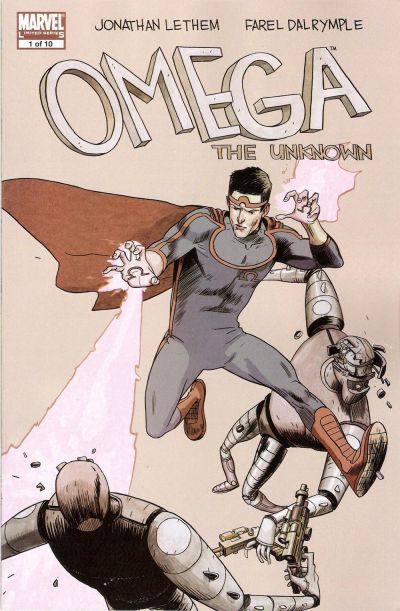

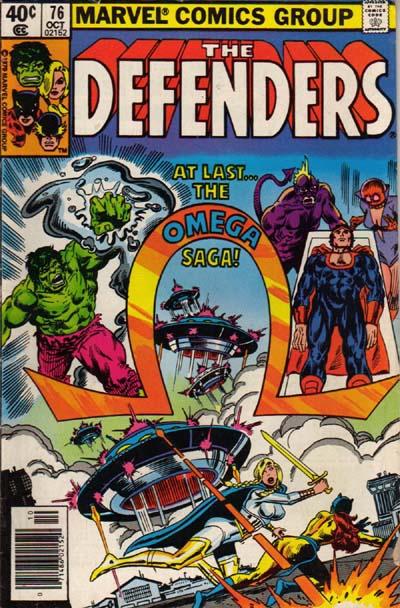


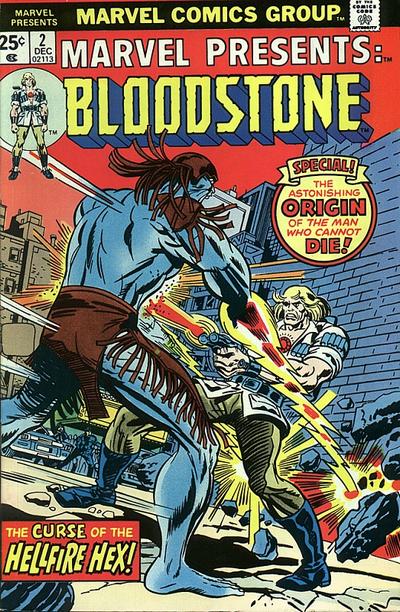

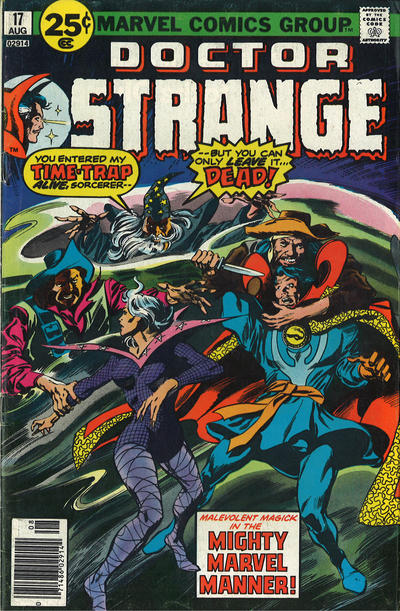


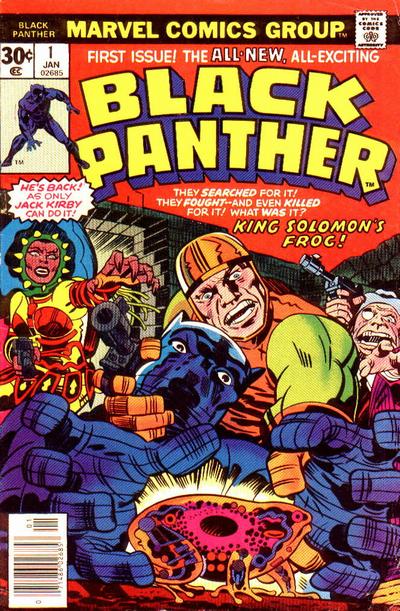
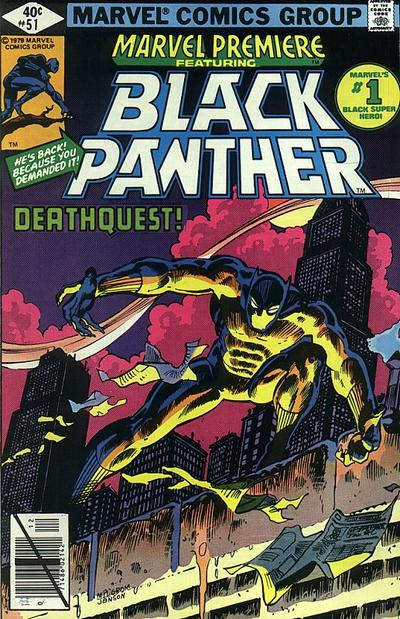
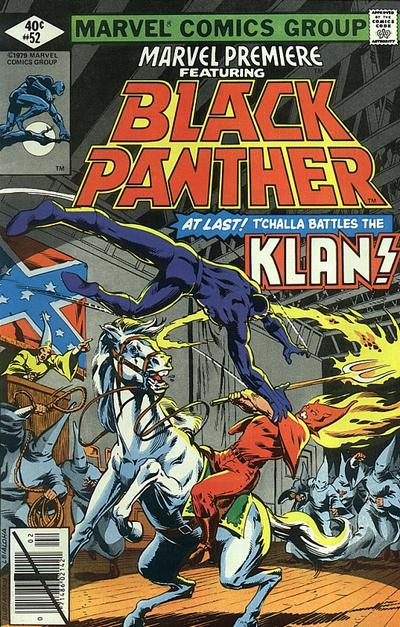


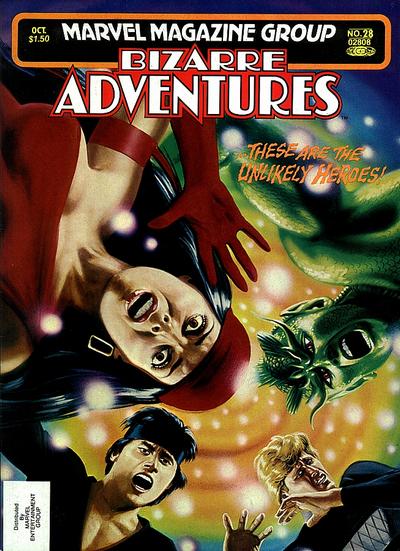
As often for me, a mixed bag. I did like McGregor’s T’Challa run and I think it’s amazing how much he developed and fleshed out Wakanda (though none of it was used later).
Kirby’s run was fun enough but not that fun. And T’Challa might as well have been Daredevil or Man-Mountain Marko — he was just there for the first six issues to be Big Strong Guy Who Fights (after that we got back to Wakanda). Kirby wanted to detach from Marvel and pre-existing characters as much as possible so there’d be no debate over who created what and wrote what. So nobody from McGregor’s run showed up. Despite the florid prose, it’s still outstanding.
Hannigan? Dear god, he’s the rock bottom of the Bronze Age for me. Tom Brevoort has been recounting some of his Defenders work on his blog and I’m remembering what an utter slog it was to read (on the newsstand, I didn’t buy it).
I agree with Greg about Bloodstone (at some point I have to blog about the Rampaging Hulk and Bloodstone too) and Omega. It would have been nice to see them end properly, though some people say Gerber probably didn’t have one mapped out (does anyone know for sure?). Grant’s story was okay at the time; rereading in the TPB I realized it rips off the end of the Korvac saga (Omega would have brought wonderful things into this world! By destroying him, the Defenders made the world worse!).
The backup features in Rampaging Hulk/Hulk Magazine were always better than the lead feature. Bloodstone, Shanna, Moon Knight, Dominic Fortune….so much better!
Kirby was doing old fashioned pulp adventure stuff, in Black Panther, which was pretty good, taken in its own context, rather than following on McGregor. He mixed in stuff from H Rider Haggard, Talbot Mundy and Edgar Rice Burroughs, plus some stuff from the headlines, when it came to modern Africa, but one where Wakanda exists as a hidden land.
I loved McGregor and found him to be a much better pure writer than the majority of his contemporaries, with some exceptions. Doug Moench was a better pulp writer, Gerber was better at satire and Englehart handled superheroes better; but, McGregor had it over most of them with character and lyrical writing. Killraven, with Russell’s art is just a thing of beauty, with great visuals, inventive ideas, poetic writing and some deep commentary on the state of mankind.
By the by, that repurposed Logan’s Run story, in Bizarre Adventures? It was mostly just a rehash of the basic Logan’s Run plot, with names changed. Not really continuing where they had left off and not really extending the story after the original plot. The two follow on issues had more in common with Logan’s World, as Logan faces the consequences of his actions, while needing to re-enter the city. This one just kind of laid out the whole Sandman/Runner structure, but called them Hunters, without really adding anything that wasn’t in the first couple of issues of the adaptation.
I’ve bounced off Killraven the couple of times I’ve tried it, which surprises me.
I think I’d have enjoyed a Kirby book about the Collectors (anything where you have character names like “Silas Mourner” …) more than the book we got. Though Kirby’s run does have the distinction of establishing “Black Panther” as a family title rather than T’Challa’s personal role.
So many thoughts here; on Omega, I agree that the conclusion in Defenders was simply awful. Hate to get all down on Grant, but it’s like he didn’t even pretend he got the point of the original series. Very much a “they all drove off a cliff and died” ending.
As for Black Panther vs. the Klan story – I can’t diss the 3-part conclusion in Marvel Premiere too much, because it was that story that prompted me to track down the Jungle Action issues that contained the first part. And that in turn led me to discovering McGregor’s work on Black Panther in general, so in my head canon his BP (including Panther’s Quest and Panther’s Prey) is the ‘real’ stuff, everything else is fan-fiction as far as I’m concerned.
And Hannigan’s conclusion, while not great, is not nearly as bad as the Omega story in Defenders. There seemed to be at least some attempt acknowledge and show some respect for what came before. However, I can’t disagree more with Greg about it possibly being better than “Panther’s Rage” (!) Blasphemy, I say.
I know it’s not the point of this post, but man, I *really* didn’t like Lethem’s Omega.
Decades after Omega, Gerber made a comment while promoting his cretor-owned Nevada that is germane to this topic. It was something along the lines of needing to be careful about plotting because in a standalone story, he couldn’t just have Doctor Strange cast a spell and save the day. It led me to believe (and this is speculation territory, to be sure) that Gerber plotted as he went. The point being, I’m not certain there *is* a definitive ending to Omega, even though Gerber’s co-writer, Mary Skrenes, says she’s carrying that secret of Omega to her grave. In any event, I would guess the secret may be a bullet point or two, but not anything like a series bible or even a detailed plot of a final story. Gerber was brilliant, to be sure, but his brilliance, it seems to me, occurred in the moment.